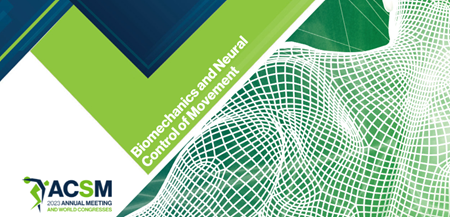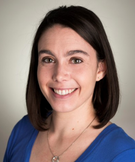Allison H. Gruber, Ph.D., FACSM |
April
21, 2023
 The 2023 ACSM Annual Meeting is packed with more Biomechanics and Neural Control of Movement content than ever before. This year, the Biomechanics and Neural Control of Movement topical area has seven special sessions (i.e., symposia and tutorial lectures), additional content being offered exclusively online, and an exciting group of interdisciplinary topics being presented through the free communication sessions.
The 2023 ACSM Annual Meeting is packed with more Biomechanics and Neural Control of Movement content than ever before. This year, the Biomechanics and Neural Control of Movement topical area has seven special sessions (i.e., symposia and tutorial lectures), additional content being offered exclusively online, and an exciting group of interdisciplinary topics being presented through the free communication sessions.
The free communication portion of the Biomechanics and Neural Control of Movement content will begin with a podium session on “Parkinson's Disease” (Wednesday May 31, 9:30 – 11:30 a.m.) and poster sessions on “Baseball & Softball Biomechanics” and “Methods & Alternative Measurement Techniques” Wednesday May 31, 9:30 a.m. – 12:30 p.m.). Other free communication sessions include: a thematic poster session titled, “Arthritis” (Friday, June 2, 3:45 – 5:45 p.m.) which will include research on arthritis and osteoarthritis; a thematic poster session titled, “Biomechanical Considerations for ACL Injury & Rehabilitation” (Thursday June 1, 9:30 – 11:30 a.m.); a rapid-fire podium session titled, “Special Topics in Gait Biomechanics” (Thursday June 1, 3:45 – 5:45 p.m.); a thematic poster session on “Running Injury” (Friday June 2, 1:30 – 3:30 p.m.); and poster sessions dedicated to running mechanics, concussions, military health biomechanics, aging, ankle instability, jumping & landing biomechanics, among other great topics.
Our showcase highlighted symposium this year is “Moving & Shaking: Biomechanical and Motor Considerations for Cancer Treatment and Rehab” (Thursday June 1, 1:30 – 3:30 p.m). Presenters include David Lipps, Ph.D. (University of Michigan), Srikant Vallabhajosula, Ph.D. (Elon University), Shane Murphy, Ph.D. (University of Wisconsin, Lacrosse), and Lise Worthen-Chaudhari, PhD, MFA, CMES (Ohio State University) and chaired by Ajit Chaudhari, PhD, FACSM (Ohio State University). This symposium will present the biomechanical and motor effects of cancer and cancer treatment including the effects on neuromuscular tissues and human functional performance. Preliminary data from exercise interventions to improve biomechanical function in cancer patients will be presented and considerations for designing therapeutic interventions that consider movement capabilities of cancer patients and reduce the risk of falls will be discussed. An additional goal of this symposium is to highlight the importance of small, pragmatic trials as critical steppingstones to increase our understanding of the biomechanical challenges facing cancer survivors and our ability to improve exercise and mobility-focused interventions for them.
The two symposia for the Biomechanics and Neural Control of Movement topical area include:
Wednesday May 31, 1:30 – 3:30 p.m. “Can a Causal Framework Improve the Science and Rehabilitation of the Injured Runner?” presented by Chris Napier, PT, Ph.D. (Simon Fraser University), Rich Willy, PT, Ph.D. (University of Montana, Missoula), Emily Kraus, MD (Stanford University), Shalaya Kipp, MS (University of British Columbia), as well as distance runner and author, Lauren Fleshman. The historical focus on a single factor (e.g., biomechanics, strengthening) has not been effective in the prevention of running-related injuries. This symposium will discuss a causal framework that considers the complexity of injury within the context of the runner and the complex interaction between runner’s biomechanics, applied training loads, energy availability, nutrition, physiology, and psychology. Examining running injuries from this framework may be more insightful in the prevention and treatment of running related injuries than historical approaches. Overall, this proposal aims to present a multi-disciplinary approach, including discussion from the athlete’s perspective, to challenge and improve upon current approaches to the research and care of the injured runner.
Friday June 2, 3:45 – 5:45 p.m. “Data-Driven Biomechanics to Optimize Performance and Prevent Injuries” presented by Michael Hahn, Ph.D. (University of Oregon), Jennifer Hicks, Ph.D. (Stanford University), Michael Fredericson, M.D., FACSM (Stanford University), Swithin Razu, Ph.D. (University of California, San Diego), and chaired by Scott Delp, Ph.D. (Stanford University). Artificial intelligence (AI) has transformed fields including natural language processing and computer vision. With growing data available about human performance from wearable sensors and video, AI is poised to have a similar transformative effect on the study of human movement biomechanics. Researchers are now examining cohorts that are orders of magnitude larger than the typical biomechanics study. Findings from these studies could provide athletes of all types and abilities with personalized, data-driven insights to customize their training and recovery. This symposium will feature research that uses large-scale datasets, such as those provided by wearable and mobile sensors, to uncover underlying biomechanical mechanisms of injury and performance, and provide meaningful insights to improve training, screening, rehabilitation, and return-to-play. Speakers will discuss both the challenges associated with analyzing datasets that may be “messier” than typical experiments, as well as the transformative opportunities of AI for movement biomechanics and human performance.
Tutorial lectures include:
-
“Knee Hyperextension, the Underappreciated Knee Pathology” (Wednesday May 31, 10:40 – 11:30 a.m.) presented by Patricia Teran-Wodzinski, PT, Ph.D, Irene Davis, Ph.D., P.T., FACSM, and Mackenzie Garreth, PT, DPT, OCS all from the University of South Florida.
-
“What we Know and What we Don't Know Regarding Gait Biomechanics in Aging” (Thursday June 1, 8:25 – 9:15 a.m.) presented by Jaimie Roper, Ph.D., Patrick Monaghan, MS, and Brandon Peoples from Auburn University.
-
“Footwear Debate” (Friday June 2, 10:40 – 11:30 a.m.) led by Irene Davis, Ph.D., P.T., FACSM (University of Southern Florida)
-
“Instrumented Mouthguards: Best Practices and Lessons Learned for Compliance in Sports” (Friday June 2, 1:30 – 2:20 p.m.) presented by Nicholas Murray, Ph.D. (University of Nevada, Reno) and Enora Le Flao, Ph.D. (Stanford University)
-
Online Exclusive – “Searching for “Optimal” Loading in Groups at High Risk for Knee Osteoarthritis” presented by Derek Pamukoff, Ph.D. (Western University) and Brian Pietrosimone, Ph.D., FACSM (University of North Carolina, Chapel Hill)
-
Online Exclusive – “Emerging Technologies for Evaluating Human Motion in Sports & Exercise Medicine” presented by Cindy Lin, M.D., FACSM (University of Washington, Seattle), Cayce Onks, DO, MS, ATC (Pennsylvania State University, Hershey), and Matthew Silvis, M.D. (Pennsylvania State University, Hershey)
There are several other sessions that will be of interest to biomechanists and motor controlists that are being presented throughout the Annual Meeting and World Congresses, such as the symposium titled, “The Age-Related Changes in Gait Biomechanics and the Energy Cost of Walking in Old Age: Where Are We and What Do We Need to Know?” (Thursday June 1, 3:45 – 5:45 p.m.) presented by Jane Kent, Ph.D., FACSM (University of Massachusetts, Amherst), Katherine Boyer, Ph.D. (University of Massachusetts, Amherst), Brian Umberger, Ph.D. (University of Michigan), and James Finley, Ph.D. (University of Southern California). This session is included within the program for The World Congress on the Basic Science of Physical Activity and Aging Biology.
The Biomechanics Interest Group (BIG) will be hosting their meeting on site. Stay tuned to their website and Twitter for details about the event as they become available. The BIG meeting will include a social event, awards ceremony, and a talk by the 2023 ACSM-BIG Career Achievement Award Winner.
Join Us at the ACSM Annual Meeting
 Allison H. Gruber, Ph.D., FACSM, is an Associate Professor of Kinesiology in the Indiana University School of Public Health – Bloomington. She is the Topical Representative for Biomechanics and Neural Control of Movement and a previous chairperson of the ACSM Biomechanics Interest Group. Her research interests include the mechanisms of running-related musculoskeletal injuries, wearable technology, and using advanced analysis techniques to better understand biomechanical signals for gait analysis. Symposia summaries were compiled based on information provided by the submitter.
Allison H. Gruber, Ph.D., FACSM, is an Associate Professor of Kinesiology in the Indiana University School of Public Health – Bloomington. She is the Topical Representative for Biomechanics and Neural Control of Movement and a previous chairperson of the ACSM Biomechanics Interest Group. Her research interests include the mechanisms of running-related musculoskeletal injuries, wearable technology, and using advanced analysis techniques to better understand biomechanical signals for gait analysis. Symposia summaries were compiled based on information provided by the submitter.